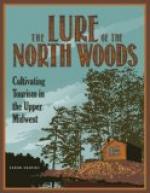A warm wind blew across the pine woods, the sun was getting hot, and the wet grounds about the shaft-head was drying fast. The river had risen as the lakes in the wilds it came from overflowed with melted snow, and raged, level with its banks, in angry flood, rolling broken trees down stream and strewing ledges and shingle with battered branches. Its hoarse roar echoed across the bush, and Thirlwell felt that there was something daunting in the deep-toned sound. One could understand that a man like Driscoll, whose brain was dulled by liquor, might let it fill him with vague terrors when the woods were still at night.
But listening to the river presently led Thirlwell to think about Strange. There was something pathetic about the story of his life, for Agatha had made Thirlwell understand her father’s long patience, gentleness, and self-sacrifice. His duty to his family had cost him much, but he had cheerfully paid. It looked as if he had done best at the task he most disliked—managing the humble store in the small wooden town. One could not think of him as having failed there. His wife and children loved him, though all but one had smiled when he talked about the lode.
His daughter, who knew him best, had inherited his confidence, and Thirlwell owned that this had some weight. She was perhaps influenced by tender sentiment, but there was nothing romantic about Driscoll and Stormont, and it looked as if they shared her belief that the lode could be found. Scott, too, thought it possible, and his judgment was often sound. Thirlwell had imagined the lode an illusion of Strange’s, but his disbelief was giving way.
Then he forgot the others and thought about Agatha. In some ways she was like Strange, but she was made of finer and stronger stuff. She had his patience, but her brain was keener, and her resolution was backed by moral force. Moreover, she was a very charming girl and Thirlwell admitted that he looked forward with eagerness to their journey. She would come in summer, when the rivers and lakes were open and the woods were filled with resinous smells. The sun was hot in the North then, the days were often calm, and there was a wonderful bracing freshness when the lingering twilight glimmered behind the pines.
It would be strangely pleasant to listen to the girl’s soft voice while the canoes glided smoothly across sparkling lakes, and perhaps to tell her stories of the wilds when the smoke of the camp-fire drifted by and the cry of the loon came out of the shadows. For all that, there was not much risk of his falling in love with her. He was not a sentimentalist, and she had told him that her vocation was science. Her journey was a duty, and when the duty was carried out she would concentrate on her studies, and as she had talent presently make her mark. He did not think she would find the lode, but when she was persuaded it could not be found he would no longer be useful and they would go their different ways. Well, he supposed he must acquiesce. He was a poor engineer, and such happiness as marriage could offer was not for him.




